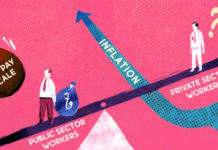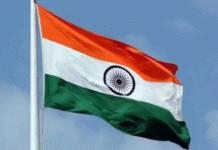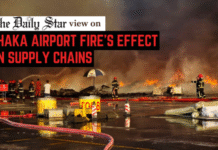 December has become our cruellest month as we lurch towards an absurd collective destiny. What the managers of Bangladesh have created is both tragic and pathetic as the role of political parties seems to be as much about holding elections as it is about sheltering criminals. Every national event whether it’s the mourning of the martyrs or celebration of victories, becomes a puny homage to political party leaders themselves. 1971 had two main objectives: (a) Defend ourselves from the Pakistani attack; (b) Build the platform for a Bangladesh that is just and fair, prosperous and courageous, hopeful and democratic.
December has become our cruellest month as we lurch towards an absurd collective destiny. What the managers of Bangladesh have created is both tragic and pathetic as the role of political parties seems to be as much about holding elections as it is about sheltering criminals. Every national event whether it’s the mourning of the martyrs or celebration of victories, becomes a puny homage to political party leaders themselves. 1971 had two main objectives: (a) Defend ourselves from the Pakistani attack; (b) Build the platform for a Bangladesh that is just and fair, prosperous and courageous, hopeful and democratic.
The first objective was met in 1971 but the second one lies in tatters. Every December is a reminder of our failure and an embarrassment caused by that making it the cruellest month.
* * *
Few remembered his real name in the training camp in 1971. They called him “Shaheed” because he would say that his only ambition was to be a shaheed. He was very categorical about it. “Don’t you see how the camp is a mess? People fighting with each other and doing petty politics with everything. This is what is going to happen after liberation. You all live with it, I want to die so that I experience only the best and never see the dark. I want to be a shaheed.” So he became Shaheed to all.
There was Pakistani machinegun nest near the border where the camp lay. It was an effective one and made crossing almost impossible. One day a bunch of BD and Indian officers came and laid down a plan. If a lot of noise and distraction was made, they could cross the river and then attack the Pakistanis from behind.
Hundreds of people from the refugee reception camp gathered near a hill and began to beat plates, sticks, whatever they could lay their hands on and screamed rhythmically under “Shaheed’s leadership to make as much noise as possible. As this was on, a raid party crossed the narrow river and mounted the attack. It was a successful attack. When it was over, there was only one casualty, Shaheed. At the final moments he climbed to the hill top and beat the two sticks together screaming at the Pakistanis. A bullet to his chest ended his defiance, his anger, his madness and fulfilled his ambition.
After all this years, I think he knew what was going to happen and just didn’t care whether he lived or died. He chose the greatest moment of our history, the moment of endless possibilities and guessing what would happen to our collective dreams, he chose to step out. This journey from 1971 to now, it has not been worth it and Shaheed knew it already.
* * *
December in Dhaka in 1971 was cruel, brutal but full of hope. Maybe there were more dreams than hope. There was shortage everywhere and smart people were making money almost from the day the country was free of Pakistani control. Looking back, I think this was the true reality reflecting the things to come. In the dusk of the 16th, soldiers were strolling the streets, Bangladeshis and Indians and people were shouting, “Joy Bangla” and the slogan has never sounded so sweet and so dear. In the most unbelievable of days, we saw victory and we believed it. We believed in the possible.
Or was it the impossible, seeking a better and sensible life for all?
* * *
Suleman was a friend who while crossing to Bangladesh with his group was caught unaware by a stray army truck. As the Pak army fired and his friends stood confused and rooted to the ground, Suleman jumped up and fired till a panic stricken Pak army jeep retreated leaving behind a Suleman with a cluster of bullets in his back but his friends safe. He never recovered and ended his life in a decrepit home for the paralyzed spending out his days in a wheelchair.
That didn’t mean he was full of cheer about his life in the present. He was the most foulmouthed person I have ever met and in his final days spent time finding new ways to abuse all that Bangladesh has become today. Yet he never said a word of complaint about the injuries that disabled him so terribly.
We all know it has never been about suffering in 1971. It has always been about suffering and the indignity people have experienced after the war was over.
I have always thought the slow crippling death of Suleman was the most apt metaphor for Bangladesh.
* * *
In just one month, we have seen like a real life movie what Bangladesh has become. A young man called Biswajit was murdered in front of everyone in a manner that reminds everyone of the killing of 1971. To say its brutal is absurd because this defies any description. Each of us must battle with our own demons to say what it made us feel. He was an innocent person, whose only crime was his proximity to the scene of the crime. It reminds me that in 1971, innocents too were killed with just as much brutality.
* * *
But what has been equally brutal is the way the Government has dealt with the matter. First, the killers were outsiders, then expelled activists from Chhatra League and then relatives of Jamaat-BNP leaders. What next? The handling of the affair has been so messy and silly and pathetic that this could only have been done by a group that simply doesn’t care what happens, who says what and knows that nothing can happen.
In 2000, Mohiuddin Ahmed, Prof. Muntasir Mamoon and I went to Pakistan to talk to the Pakistanis about 1971. One person, an ex-member of the Pakistan Planning Commission told us that Bengalis did not get any development projects in the Pakistan era because they just were not intelligent enough to propose decent projects or handle them if they were given any.
As I hear the home minister tell us what happened, who committed the murder and their identities and how everything is an attempt to thwart the war crimes trial, etc. I heard and saw Pakistan. Just as Pakistan would respond to every Bengali complaint with the ‘Islam is in danger’ slogan, the present Government is doing the same. We are just too stupid and dumb to even understand what is going on. Nice to see Pakistan alive and well in Bangladesh in the mind of those who are supposed to be the most ardent anti-Pakistani.
Source: bdnews24









